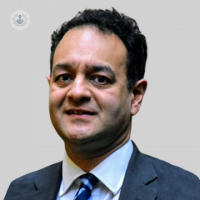How is asthma diagnosed?
Written in association with:Top Doctors recently spoke to Professor Suveer Singh, an esteemed respiratory, sleep, and critical care consultant, to speak about the causes of asthma, the main risk factors, and how it can be treated and managed effectively.

What causes asthma?
The causes of asthma, unfortunately, are not yet fully understood. Occasionally, an allergen (e.g. pollen, dust mites, certain foods, insect bites and stings etc) can come into contact with your immune system, which can lead to asthma.
When this occurs, the immune system can react strongly, leading to inflammation. Inflammation is a protective response, and can typically result in your airways becoming swollen and narrow. In addition, specialised cells that line the airways may, as a result of the narrowing and swelling, begin to produce more mucus.
Inflammation in one’s airways can inevitably make breathing more difficult and causes the muscles in and around your respiratory tract to tighten. If someone experiences this on a consistent basis, or if they have suffered from a more serious viral infection during early childhood, research suggests that this can lead to the development of asthma.
What are the main associated risk factors?
There are quite the number of risk factors which can impact the likelihood of you developing asthma. They include the following:
- being exposed to cigarette smoke in the womb or very early childhood
- coming into contact with particular microbes in the air
- the workplace environment
- exposure to atmospheric pollution, pollen, dust and other allergens
- having a large number of allergies
- obesity
- underlying lung conditions
- genetic factors
Are asthma triggers the same for all sufferers?
The triggers and asthmatic response differ on a case-by-case basis.
How is asthma diagnosed?
If asthma is suspected based on the patient’s symptoms, a range of tests will be carried out to confirm this. Firstly, the doctor will perform a physical exam in order to evaluate the patient’s breathing.
A spirometry test may also be carried out, which will assess how fast and how much air is entering and exiting the patient’s lungs when they take a large breath and forcefully exhale with specialised equipment.
Where necessary, a doctor can also perform certain tests that are designed to determine whether particular allergens or irritants cause a reaction in the airway of the patient being assessed. These are referred to as bronchoprovocation tests. Allergy tests can also be performed to investigate and confirm any allergies.
What does treatment involve?
The treatment of asthma typically involves a number of different medicines, which will of course depend on the patient’s particular circumstance.
Professor Suveer Singh is a highly regarded and experienced respiratory, sleep, and critical care consultant who is an expert when it comes to asthma. Consult with him today via his Top Doctors profile.



